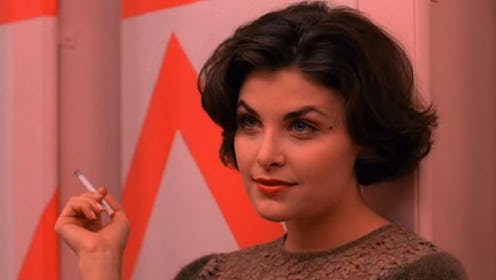Entertainment
Is 'Twin Peaks' a Feminist Show?

The recently announced Twin Peaks reboot feels all the more real now that the original series’ stars are collecting as returning players. Kyle McLachlan has boarded to reawaken his earnest-to-a-fault FBI Agent Dale Cooper, and Sheryl Lee is rumored to bring the ill-fated Laura Palmer (or her identical cousin Maddy Ferguson… also dead) back to life. Best of all: a revival of Audrey Horne, via the cherry-tying Sherilyn Fenn, springs likewise from the rumor mill.
Thus, we’re charged with imagining what kind of Twin Peaks might find its way between the margins of contemporary entertainment. David Lynch’s fiction barely ever takes place in a cohesive reality, let alone in a definable time period. In Twin Peaks as well as in his cinema, Lynch has melded elements from eras prior with tenets of striking modernity, amounting worlds that have always felt creatively fresh. But what about ideologically?
Lynch hasn’t made a film since 2002’s Rabbits, and hasn’t given us a new glimpse into the macabre backdrop of Twin Peaks since its post-finale prequel feature Fire Walk with Me in 1992. The world was a different place back in the show’s pre-Clinton era. Not quite as anchored to the nuclear denial as the society of Twin Peaks itself, America’s early ‘90s were nonetheless a period wherein a show (like Lynch’s) could get away with some more regrettable antics.
Even the most diehard fans of Twin Peaks’ original run will recall a few choices that never felt quite up to speed with the show’s decidedly progressive edge, especially in the latter chapters. Devolution into stories about Cooper’s extramarital affairs, Audrey’s wide-eyed ploys for moral reform, and (shudder) Miss Twin Peaks Beauty Contests marked more than isolate travesty; these turns felt like a betrayal to everything Twin Peaks instituted in its earlier episodes.
The common thread among these failings is the involvement of Twin Peaks’ treatment of its women — not just individually, but as a collective function. In its inception, Twin Peaks instituted subversion unto each and every element it tackled. It broke down the fabric of small town America, upended the romantic psyche of soap opera lore, and through all achievements, cut a gaping hole into every conceivable doctrine of conservatism it could.
The show’s strongest muscle was perhaps its feminism; though we were carted through Twin Peaks on the back of an imperialistic male (you could even make a case that Dale Cooper marked an early example of the sort of gentrification that’d begin to hit New York’s outer boroughs 15 years down the line), our voyages through the city’s bloodstream came courtesy of its younger female characters.
Lara Flynn Boyle’s amateur sleuth, teenager Donna, traversed without hesitation the dankest and weirdest crevasses of her Washington woodlands. She was our real adventurer, the character to whom the show’s most thrilling and frightening components hinged. Dale and his crack team of local lawmen — led by Sheriff Harry Truman, the utmost example of alpha male masculinity (gruff, contentious, noble, didactic, orphaned from verbal acuity) — and fellow federal agents — the compulsively caustic Albert Rosenfield (Miguel Ferrer) and comfortably delusional Gordon Cole (Lynch himself) — courier comfort for the viewing audience as they investigate the town’s labyrinthine mysteries from a safe distance. Donna, on the other hand, finds herself, rather, gets herself (it’s never for lack of agency) consistently entangled in the plentiful dangers lurking beneath the sheen of Twin Peaks. Cooper might be the show’s lead, but she’s the true hero of the adventure.
But Donna is not the picture of unflappable stature. She is regularly scared, uncertain, and leagues from her bearings… though never to a point that fissures her will to plunge further into the lumber town’s many mysteries. She’s simply more of an Indiana Jones than a James Bond. Cooper isn’t Twin Beaks’ Bond either, too smooth and sugary to earn this denomination. So who is? The show’s other adventure bound high school-aged lass: Audrey Horne.
A return to Twin Peaks for Sherilyn Fenn could institute a return to form for Audrey Horne. Though we left off with an Audrey hardly recognizable to early era fans, Lynch will have to do an awful lot of retconning and reconfiguring to work her into the reboot at all. (As you’ll recall, a whole mess of people died at the end of Twin Peaks. She was one of ‘em.)
The Audrey who intoxicated us all was impermeable. She was wry, self-serving, forever in command of herself and any room into which she might enter. Even when kidnapped by the nefarious staff of One Eyed Jack’s, Audrey felt nary more than an arm’s reach from total control of the situation. Yes, the show used Fenn’s sexuality as a beacon for the character’s power; she could entrance, manipulate, and boost ratings with a devilish stare and the oral contortion of a cherry stem. But Audrey’s hypnotic prowess was only her tool, not her character. She was smarter, more confident, and tons more capable than almost anyone else in Twin Peaks. But somewhere down the line, they decided she was a little too prickly. So she became a Born Again.
On its way back to the airwaves two decades after its cancelation, Twin Peaks will have a new world of standards to live up to (and subvert) this time around. The mere sight of young women taking on danger and command won’t be quite enough to stand above this generation’s output of progressive material; let’s hope that Lynch and company might be able to up the ante on the past 20 years of social liberation, just as his show did way back when… especially if we’re still dealing with missteps like Miss Twin Peaks. Oy.
Images: ABC (4)